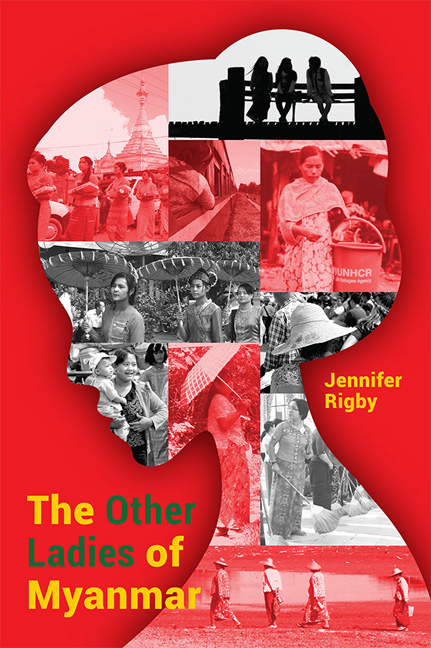Book contents
- Frontmatter
- Dedication
- Contents
- Preface
- Acknowledgements
- Introduction
- Timeline
- 1 The Activist: Cheery Zahau
- 2 The Feminist Buddhist Nun: Ketu Mala
- 3 The Survivor: Mi Mi
- 4 The Businesswoman: Yin Myo Su
- 5 The Environmental Campaigner and Princess: Devi Thant Cin
- 6 The Artist: Ma Ei
- 7 The Refugee Sexual Health Nurse: Mu Tha Paw
- 8 The Rohingya and Human Rights Champion: Wai Wai Nu
- 9 The Farmer: Mar Mar Swe
- 10 The Pop Star: Ah Moon
- 11 The Politician: Htin Htin Htay
- 12 The Archer: Aung Ngeain
- Conclusion
- About the Author
2 - The Feminist Buddhist Nun: Ketu Mala
Published online by Cambridge University Press: 08 June 2019
- Frontmatter
- Dedication
- Contents
- Preface
- Acknowledgements
- Introduction
- Timeline
- 1 The Activist: Cheery Zahau
- 2 The Feminist Buddhist Nun: Ketu Mala
- 3 The Survivor: Mi Mi
- 4 The Businesswoman: Yin Myo Su
- 5 The Environmental Campaigner and Princess: Devi Thant Cin
- 6 The Artist: Ma Ei
- 7 The Refugee Sexual Health Nurse: Mu Tha Paw
- 8 The Rohingya and Human Rights Champion: Wai Wai Nu
- 9 The Farmer: Mar Mar Swe
- 10 The Pop Star: Ah Moon
- 11 The Politician: Htin Htin Htay
- 12 The Archer: Aung Ngeain
- Conclusion
- About the Author
Summary
IN MYANMAR, one of the most common everyday sights is a line of Buddhist monks, barefoot, shaven headed, clad in scarlet robes. Early in the morning, they queue up outside shops, houses and restaurants to receive alms — food and support from lay people.
For foreigners, they are also one of the most exotic sights, eagerly snapped on smartphones and cameras. But you don't just see monks. There are nuns too, also with bare feet and shaven heads. They normally wear pink robes with an orange sash.
However, according to the type of Buddhism practised in Myanmar, they are not really nuns at all. According to Theravada Buddhism, women cannot be ordained as nuns, because their order is basically extinct. They are, at best, known as “renunciants”, lay women who have taken vows to live according to Buddha's teachings — and there are 60,000 of them in Myanmar (despite their official non-existence).
But these nuns can't preach, become senior members of the Buddhist community, or even enter some parts of pagodas. They also don't get anywhere near the respect afforded to monks in this deeply religious country, and often even struggle for food donations. It's hardly the image of equality, tolerance and harmony that Buddhism often has in the West.
Ketu Mala is a Burmese nun, and she's not happy about this inequality. She's not just any nun, either. She founded the incredibly successful Dhamma School Foundation, which brings Buddhist teachings into education in Myanmar. She recently met UN Secretary General Ban Ki-Moon, and leads lectures all over Asia. And she's a feminist — a feminist nun.
We meet in one of her friend's houses near Yangon airport.
“Let's face it,” she says, speaking partly in English and partly Burmese.
“Myanmar has and has had a male-dominated, patriarchal society, which also means the majority of religion is also dominated by men. The role of women in the religious sector can sometimes even be remarked upon as non-existent. It's that small. Why? Because the patriarchy is deep-rooted in Myanmar, this is the main point.”
To even say these kinds of things in Myanmar is pretty incendiary. Ketu Mala explains that the leading monks in Myanmar, known as the Bhikkhu Sangha, find this kind of talk threatening.
- Type
- Chapter
- Information
- The Other Ladies of Myanmar , pp. 14 - 23Publisher: ISEAS–Yusof Ishak InstitutePrint publication year: 2018



